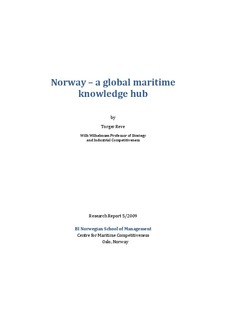| dc.description.abstract | Knowledge based industrial development takes place in Global Knowledge Hubs or superclusters characterized by a high concentration of innovative industrial actors interacting closely with advanced research institutions, venture capital and competent ownership. The extreme example of a global knowledge hub is the biotech and life science industry in Boston. The greater Boston area has a higher concentration of advanced universities, research labs and specialized biotech firms, than anywhere else in the world. Thus Boston has taken the global leadership position in the high growth biotech industries by capitalizing on their knowledge resources.
In this report, the global knowledge hub model is applied to the Norwegian maritime industry. The Norwegian maritime and offshore industry is characterized by a high number of global actors operating out of Norway, forming subclusters in shipping, technological and commercial maritime services, specialized ship building and ship equipment, energy and offshore industry, maritime and subsea operations. Norway has build a strong global maritime knowledge base, extending from fisheries and governance of marine resources, to shipping, maritime operations, and offshore oil and gas, especially when it comes to deep and arctic waters. Norway combines the knowledge and technology targeting the marine, maritime and energy industries.
For sustaining such a global knowledge position in the maritime areas, Norway needs to develop specialized knowledge infrastructure to attract talent and technology on a global basis. The plans for establishing a new Ocean Space Center at Marintek and NTNU in Trondheim should be understood and analyzed in these terms. The ambition is to create a global knowledge center for Ocean Space Technology, covering a large range of ocean space challenges of the future, including the high priority arctic and climate challenges. | en |
